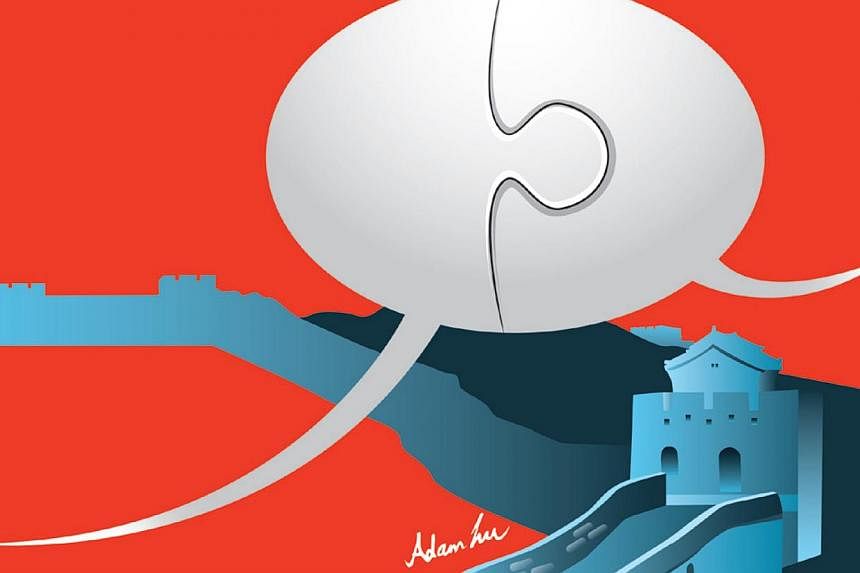Since I relocated to China for work, I've stopped saying sorry.
Not because I've suddenly decided to turn stubborn or rude, but I've literally stopped saying the word "sorry" because people don't use it here.
Instead, now I always say "bu hao yi si", which is Chinese for "sorry" or "excuse me".
On paper, it sounded simple enough. "Bu hao yi si" is Chinese 101, like "ni hao" (hello), "xie xie" (thank you) and "wo yao zhong ma piao" (I want to strike lottery).
Yet it took me a while to make this transition because it's surprisingly one of the Chinese phrases I use least in Singapore.
Even if I'm in the midst of a flowing conversation in Mandarin while walking along Orchard Road, if I bump into someone mid-sentence, the word I'll use is "sorry".
It made me realise how much I take my mixing of languages for granted in Singapore and how much of a challenge speaking entirely in Mandarin can be.
Despite how simple it is, "bu hao yi si" was a real mouthful. That's four syllables to mutter to each commuter in my path on Beijing's crowded subway, when I used to be able to get away with a string of "'Scuse, 'scuse" on Singapore's MRT.
Indeed, it has been the everyday words that have unwittingly posed challenges for me during my first two months in Beijing, partly because these are the words that I have to use the most.
I had expected the opposite, thinking it would be specialised phrases such as "fang kong shi bie qu" (air defence identification zone), "liang hua kuan song" (quantitative easing) or "huan tai ping yang jun shi yan xi" (Pacific Rim military exercise) that would trip me up.
Instead, I was left wondering what a tray was in Mandarin.
"See, nobody knows," said my youngest brother, who has been finding a lot of joy thinking of seemingly common Chinese phrases that we somehow never use.
After asking around with a few Singaporean friends, I found someone who actually knew. She was a professional translator.
It's "tuo pan", she said.
I've heard that term used, like, zero times in a Singaporean coffee shop.
Slightly more specialised but just as important when I came to Internet- loving, phone app-embracing Beijing are terms used online.
What is Chinese for "click", "log in" and "activate"? I found myself staring for long periods at my computer screen when I first arrived, trying to find out which link to "dian ji", so that I can "deng lu" and "ji huo" my account (that's click, log in and activate respectively).
Online shopping took hours not because I was filling my cart with cheap products, but because I wasn't sure how to search for "ironing board" or "air purifier" in Chinese.
Now these words roll off my tongue a little more easily, but it has brought back memories of my secondary school days. I studied in a Special Assistance Plan, or SAP school, where Chinese standards were supposedly higher.
But there was one day - perhaps when the whole class couldn't answer what "tray" or "ironing board" was - that my Chinese teacher told us all off, saying "it was a joke" that we were studying Higher Chinese, or Chinese as a first language.
"Only in Singapore is this considered Higher Chinese," she scoffed. "This is only elementary Chinese."
She'll be pleased that my Chinese will probably improve during my time working in Beijing, a city where English is barely spoken.
Then there are the local terms I'll need to get used to, such as "chu zu che", which the Chinese use to refer to taxis rather than "de shi", which is used in Singapore. And I hear people say "yun yi fu" rather than "tang yi fu", when they talk about ironing clothes.
I'm sure there will be more to come in the months ahead.
But one thing I'll never completely get the hang of is ordering food like a local at Chinese eateries.
Chinese dishes, it seems, are not allowed to have fewer than 10 characters, in what looks like an attempt to make the dish sound more delicious or pretty.
It's all lost on me. As someone used to barking simple phrases such as "hor fun" and "chao fan" (fried rice) at the local zi char stall, this task is proving insurmountable.
So I typically just order using the last two or three characters of the dish, while pointing to the picture in the menu for certainty.
For instance, "One chilli chicken." Point.
Of course, the waitress will never repeat my barbaric, abbreviated version.
"Okay, dried fragrant chillis blanket golden crispy tender chicken."
"And one vegetable soup." Point.
"One baby pak choi bathed in superior pork rib stock."
"Yes. Vegetable soup. Thanks."
Four syllables on a train is one thing, but when a starving man is waiting for his dinner, there's nothing to be "bu hao yi si" about.


